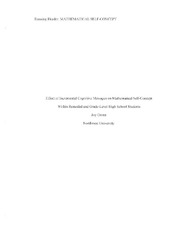| dc.description.abstract | Student self-concept, particularly within the mathematics discipline, is deeply rooted in student understanding of the control or lack of control (locus of control) that they might have over their potential for success. This understanding is tied closely with a belief in one’s innate, fixed ability (or lack thereof) to learn and master mathematics, and often is already very well-defined early on in one's academic career. Research, alternatively, has demonstrated that students not only have substantial control over their intelligence, but that intelligence itself is not a fixed commodity. In response, this study sought to evaluate the effectiveness of exposing students to relevant research to show them the control they have, and ultimately hoped to increase mathematical self-concept. Data from pretests (control and treatment groups) and posttests (treatment groups) was collected and compared both quantitatively and qualitatively to triangulate results; quantitative data was analyzed for statistical significance while qualitative was coded and sorted to note trends within the results. Further, the study evaluated both average grade-level students and struggling remedial students in order to compare any results that might highlight differences in the two groups in effectively addressing potentially unique needs related to self-concept, given that the remedial students had clearly experienced less success academically. Quantitative results demonstrated only one significant impact, notably an impersonal understanding of the content covered, demonstrating that any real impact on self-concept must also include a personal application component. This was corroborated by qualitative results which also established that students’ beliefs in abstract were altered, yet remained unchanged in their own views of themselves. | en |


 Maintained by the Northwest University Library
Maintained by the Northwest University Library